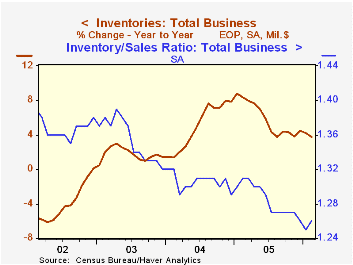 Global| Apr 13 2006
Global| Apr 13 2006U.S. Business Inventories Slipped
by:Tom Moeller
|in:Economy in Brief
Summary
Total business inventories slipped marginally during February following an upwardly revised 0.6% gain during the prior month. Consensus expectations had been for a 0.3% increase for February. Retail inventories reversed the prior [...]

Total business inventories slipped marginally during February following an upwardly revised 0.6% gain during the prior month. Consensus expectations had been for a 0.3% increase for February.
Retail inventories reversed the prior month's downwardly revised 0.3% increase. Motor vehicle inventories fell 0.7% (0.0% y/y). Retail inventories less autos also fell marginally (+3.5% y/y) and January accumulation was revised down to 0.3% from 0.5%. Furniture inventories rose a strong 0.7% (6.6% y/y) and the prior month's gain was revised up but general merchandise inventories fell by 0.6% (+2.3% y/y) after a downwardly revised 0.4% decline during January. Apparel inventories rose 0.3% (2.3% y/y after a 0.4% January decline.
Wholesale inventories rose 0.8% due to a 1.0% gain in nondurables, lifted by broad based strength. Durables rose 0.6% (6.6% y/y). During the last ten years there has been a 67% correlation between the y/y change in wholesale inventories and the change in imports of nonpetroleum goods.
Factory sector inventories slipped 0.4% after an upwardly revised 1.1% January gain.
The inventory to sales ratio for total business rose modestly to 1.26 from an upwardly revised 1.25 during January.
| Business Inventories | Feb | Jan | Y/Y | 2005 | 2004 | 2003 |
|---|---|---|---|---|---|---|
| Total | -0.0% | 0.6% | 3.7% | 4.5% | 7.9% | 1.5% |
| Retail | -0.3% | 0.3% | 2.4% | 2.7% | 6.7% | 3.8% |
| Retail excl. Autos | -0.0% | 0.3% | 3.5% | 4.5% | 7.1% | 1.9% |
| Wholesale | 0.8% | 0.2% | 6.2% | 7.1% | 9.8% | 1.8% |
| Manufacturing | -0.4% | 1.1% | 3.2% | 4.4% | 7.7% | -1.1% |
Tom Moeller
AuthorMore in Author Profile »Prior to joining Haver Analytics in 2000, Mr. Moeller worked as the Economist at Chancellor Capital Management from 1985 to 1999. There, he developed comprehensive economic forecasts and interpreted economic data for equity and fixed income portfolio managers. Also at Chancellor, Mr. Moeller worked as an equity analyst and was responsible for researching and rating companies in the economically sensitive automobile and housing industries for investment in Chancellor’s equity portfolio. Prior to joining Chancellor, Mr. Moeller was an Economist at Citibank from 1979 to 1984. He also analyzed pricing behavior in the metals industry for the Council on Wage and Price Stability in Washington, D.C. In 1999, Mr. Moeller received the award for most accurate forecast from the Forecasters' Club of New York. From 1990 to 1992 he was President of the New York Association for Business Economists. Mr. Moeller earned an M.B.A. in Finance from Fordham University, where he graduated in 1987. He holds a Bachelor of Arts in Economics from George Washington University.






